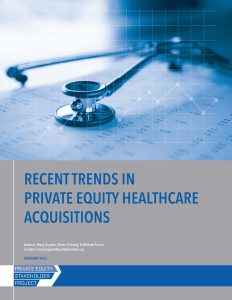
Recent Trends in Private Equity Healthcare Acquisitions
February 23, 2023
New report analyzes a frenzy of private equity activity in healthcare companies
In light of growing investor interest in healthcare and the risks associated with private equity ownership of healthcare companies, the Private Equity Stakeholder Project publishes monthly blog posts that track private equity-backed healthcare acquisitions. This report looks at the 2022 private equity deals data in review, identifying and analyzing major recent investment trends in healthcare.
Click here to access a catalog of our monthly acquisitions blog posts for 2022.
Recent Trends in Private Equity Healthcare Acquisitions
KEY TAKEAWAYS:
• Private equity healthcare investments in 2022 were the second highest on record after 2021 in terms of disclosed deal value and deal count.
• A combination of factors makes healthcare an optimal space for private equity investment: a permanent demand for healthcare services, an aging population defined by a high disease burden, and the fact that many subsectors within healthcare are fragmented and therefore ripe for consolidation.
PESP counted 125 buyouts and 503 add-on acquisitions to 364 unique platform companies in 2022. These deals involved 471 private equity firms and similar types of investors.
• The outpatient care subsector saw the most deal activity in 2022, with dental care and eye care, especially, seeing heavy deal volumes. The specialties of orthopedics and podiatry are heating up as desirable investment spaces, as well.
• Medtech, health IT, healthcare administration, contract research organizations (CROs), behavioral health, and home health and hospice made it to the top 15 categories where deal activity occurred.
• Private equity’s growing presence in the health sector and propensity for consolidation of healthcare services is cause for concern. The common private equity strategy of pursuing outsized returns over relatively short periods of time can lead to cost-cutting efforts that negatively impact patients and workers. Further, private equity firms are more likely to use debt to fund their investments, leading to unwieldy debt service obligations that can divert money away from patient care and fair compensation for employees.
• In light of growing investor interest in healthcare and the risks associated with private equity ownership of healthcare companies, regulators and lawmakers should scrutinize private equity acquisitions of healthcare companies more closely and pass and implement commonsense policies to ensure access to affordable and quality healthcare for all patients in the US.
Full report HERE.

